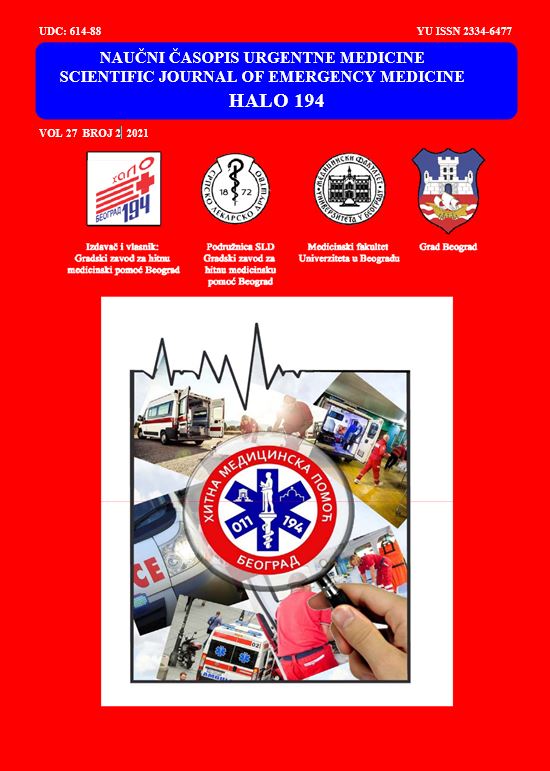Assessment of maternity knowledge and evaluation of obstacles to successful breastfeeding
Abstract
Introduction: A healthy diet is a prerequisite for a child's health. Aim: To examine the knowledge of mothers about the importance of breastfeeding, to evaluate obstacles to successful breastfeeding. Methods: The first part of the research is designed as a cross-sectional study. A questionnaire for mothers was constructed to assess their level of awareness of the importance of breastfeeding, the second part of the research includes a telephone survey, regarding the presence of obstacles to successful breastfeeding. Results: Descriptive statistics methods were used in the analysis. The largest number of women are aged between 21 and 25 (57%), 88% of children at birth received a grade of 9, 78% of women started breastfeeding the next day. After 7 days of discharge from the hospital, 7% of women did not breastfeed. Conclusion: The results of the research indicate the need for a greater degree of education of mothers about breastfeeding.
References
2. American Academy of Pediatrics. Breastfeeding and the Use of Human Milk. PEDIATRICS. 2012;129(3):827-e841.
3. Kramer M, Kakuma R. Optimal duration of exclusive breastfeeding. Cochrane Database of Systematic Reviews. 2012; 63-77.
4. Wambach K, Spencer B. Breastfeeding and human lactation. 6th ed. Denton, Texsas, USA: JONES&BARTLETT learning; 2019. 157-177.
5. Ares Segura S, Arena Ansótegui J, Marta Díaz-Gómez N. The importance of maternal nutrition during breastfeeding: Do breastfeeding mothers need nutritional supplements?. Anales de Pediatría (English Edition). 2016;84(6):347.1-347.e7.
6. McFadden A, Gavine A, Renfrew M, Wade A, Buchanan P, Taylor J et al. Support for healthy breastfeeding mothers with healthy term babies. Cochrane Database of Systematic Reviews. 2017.
7. Kekuš D. Zdravstveno vaspitanje. Beograd: Autorsko izdanje; 2009. 51-198.
8. Taylor J, Boies E. Membership in the Academy of Breastfeeding Medicine: What Are the Benefits?. Breastfeeding Medicine. 2016;11(9):490-491.
9. Blyth R, Creedy D, Dennis C, Moyle W, Pratt J, De Vries S. Effect of Maternal Confidence on Breastfeeding Duration: An Application of Breastfeeding Self-Efficacy Theory. Birth. 2002;29(4):278-284.
10. Weaver J, Schofield T, Papp L. Breastfeeding duration predicts greater maternal sensitivity over the next decade. Developmental Psychology. 2018;54(2):220-227.
11. Milankov O. Dojenje kroz vekove. Medicinski pregled. 2018; 71(5-6):151-156.
12. Cogburn G, Ketner M. The North Carolina Lactation Educator Training Program: A Report at 20 Years. Journal of Human Lactation. 2017;33(4):736-739.
13. Hansen K. Breastfeeding: a smart investment in people and in economies. The Lancet. 2016;387(10017):416.
14. Milankov O, Bjelica M, Savić R. Kojom vrstom mleka je moguće prevenirati nastanak sideropenijske anemije kod odojčadi - komparativna studija. Medicinski pregled. 2014; 67(5-6):167-171.
15. Šrek A. Uvođenje nemlečne ishrane u odojčadskom uzrastu - nove preporuke. Hrana i ishrana. 2011; 52(1):11-14.
16. Greiner T. Alcohol and Breastfeeding, a review of the issues. World Nutrition. 2019;10(1):63-88.
17. Novakov Mikić A, Vejnović T. Akušerstvo. Novi Sad: Univerzitet u Novom Sadu, Medicinski fakultet; 2020. 293-294.
- Autori zadržavaju autorska prava i pružaju časopisu pravo prvog objavljivanja rada i licenciraju ga "Creative Commons Attribution licencom" koja omogućava drugima da dele rad, uz uslov navođenja autorstva i izvornog objavljivanja u ovom časopisu.
- Autori mogu izraditi zasebne, ugovorne aranžmane za neekskluzivnu distribuciju članka objavljenog u časopisu (npr. postavljanje u institucionalni repozitorijum ili objavljivanje u knjizi), uz navođenje da je članak izvorno objavljen u ovom časopisu.
- Autorima je dozvoljeno i podstiču se da postave objavljeni članak onlajn (npr. u institucionalni repozitorijum ili na svoju internet stranicu) pre ili tokom postupka prijave rukopisa, s obzirom da takav postupak može voditi produktivnoj razmeni ideja i ranijoj i većoj citiranosti objavljenog članka (Vidi Efekti otvorenog pristupa).

